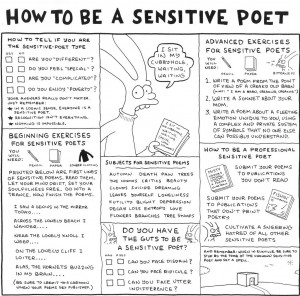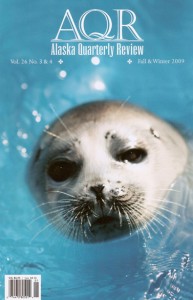 Nothing against poetry, but the newest issue of Alaska Quarterly Review (Fall & Winter 2009) is an all-prose issue – with fiction and nonfiction only. The full table of contents is available on their website.
Nothing against poetry, but the newest issue of Alaska Quarterly Review (Fall & Winter 2009) is an all-prose issue – with fiction and nonfiction only. The full table of contents is available on their website.
NewPages Blog
At the NewPages Blog readers and writers can catch up with their favorite literary and alternative magazines, independent and university presses, creative writing programs, and writing and literary events. Find new books, new issue announcements, contest winners, and so much more!
New Lit on the Block :: Lung
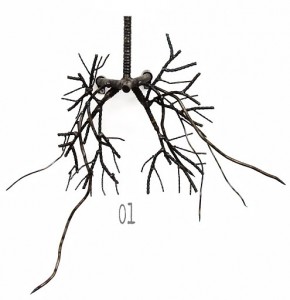 Edited by screenwriter and poet Alveraz Ricardez, Lung is an “independent peddler of unique voices in contemporary poetry.” Lung is available free online using Issuu, and is currently accepting submissions for its second publication until October 5th.
Edited by screenwriter and poet Alveraz Ricardez, Lung is an “independent peddler of unique voices in contemporary poetry.” Lung is available free online using Issuu, and is currently accepting submissions for its second publication until October 5th.
The first issue of Lung features writers whose works met the submission criteria of ‘invoking emotion but avoiding the trappings of mediocrity’ of being ‘fresh, innovative voices that have something original to say,’ and moreover being ‘unique’ and ‘jumping off the page’: Cristin O’Keefe Aptowicz, Cyril Wong, Olivia Tandon, Gabriel Ramos-Rocchio, Sandy Benitez, Nina Romano, Christopher Mulrooney, Aleathia Drehmer , Rei Thompson, J. Bradley, M.J. Hamada, Christopher Woods, Nina Ki, J. Michael Wahlgren, Janann Dawkins, Steve Meador, Derek Richards, David McIntire, and Alex Galper.
Spread the word!
CFP Cultures of Recession
An Interdisciplinary Graduate Student Conference Hosted by The Program in Literature
Duke University
November 20 & 21, 2009
NEW DEADLINE: September 15, 2009
UPDATE: Travel support is now available for some presenters due to generous support from the Duke University Center for International Studies, with priority for international speakers.
Keynote Speaker: Stanley Aronowitz (CUNY), author of How Class Works and Just Around The Corner: The Paradox of a Jobless Recovery
Around 5:00 AM on Nov. 28—the day after Thanksgiving—a Wal-Mart employee was trampled to death by shoppers eager to participate in the store’s annual “Black Friday” sales blitz. On Dec. 1, after three months of violent upheaval in the banking sector, the National Bureau of Economic Research announced that the U.S. had been in economic recession for almost a year. On Dec. 5, a group of mostly Hispanic workers staged a sit-in at Republic Windows and Doors after being laid off from the Chicago-based factory with only three days’ notice. Throughout mid-December 2008, critics lauded the “tightness” and “economy” of Kelly Reichardt’s Wendy and Lucy, an 80-minute long independent film featuring a young woman, a dog, the Pacific Northwest, and not much else. Meanwhile, the country of Iceland—designated a terrorist state by Britain in an effort to freeze some of its assets—has declared bankruptcy. Widespread economic and institutional breakdown has resulted in a new wave of urban radicalism spreading across Greece, France, Italy, Spain, and the U.K. In China, mass deprivation and joblessness riots have escalated as authorities struggle to prop up a falling GDP. Despite unprecedented bailout and stimulus spending by the Bush and Obama administrations, the U.S. stock market has receded to levels last seen in 1997, with the unemployment rate crossing 10% in some states.
This conference invites graduate students from humanities and social science disciplines to think about how the idea and experience of recession—a sustained national or global-economic downturn that makes itself visible through declines in industrial production, employment, sales, and income—frames the cultural life and livelihood of affected communities, places, and governing bodies. This shift in communal and political makeup opens space for discussion about the impact of recession on cultural forms. What sort of cultural phenomena—artistic, political, or otherwise—find expression during times of recession? Are there features of recession that seem to transcend history or geography? Are certain socioeconomic climates more or less poised to give birth to recession—and what sort of political positionalities or modes of thought find themselves competing to “solve” recessive crises? How does recession change the parameters of social and political institutions? Within the governing structure, how do power dynamics shuffle as blame is distributed between institutions and people? How might the idea of recession compare to related concepts like depression, inflation, deflation, unemployment, crisis, or overproduction? Can we identify specific literary or artistic forms, motifs, and icons that emerge during times of recession?
Possible panel or paper topics
• Recession and cultures of work
• Recession and the global economy
• Recession and the language of loss, failure, or decline
• Recession and establishment discourse
• Recession, labor struggle, and “class warfare”
• Recession and the banking-sector bailout
• Recession and debt
• Recession and the politics of greed or waste
• Recession, crisis theory, and the logic of capital
• Recession and radical political resurgences
• Recession and nostalgia
• Recession and consumer culture
• Historical recessions: the post-war ‘40s, the 1970s, Japan’s Lost Decade, etc.
• Recession in an age of Facebook, blogs, and “instant” information
• Recession and cultural production
• Recession and the politics of religion
• Recession and the politics of race, gender, and/or sexuality
• Recession and environmental/energy crises
• Recession and the university
Please send a 250-500 word abstract to culturesofrecession_at_gmail_dot_com by September 15, 2009.
ORGANIZERS
Sara Appel
Gerry Canavan
Alex Greenberg
Lisa Klarr
Ryan Vu
Spread the word!
Glimmer Train Anounces Contest Winners – 2009
Glimmer Train has just selected the 50 winning entries for their first Best Start competition. Each wins $50 and makes Glimmer Train’s Best Start list. This competition is held quarterly and is open only to writers whose fiction has not appeared in a print publication with a circulation over 3000. Each submission should be an engaging, coherent narrative, but does not need to be a complete story, just an important part of a story in progress. Word count: under 1000. Their next Best Start competition will take place in September.
Glimmer Train has also chosen the winning stories for their June Fiction Open competition. This competition is held quarterly and is open to all writers for stories with a word count range between 2000-20,000. No theme restrictions. Their monthly submission calendar may be viewed here.
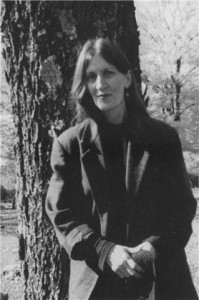 First place: Ingrid Hill (pictured) of Iowa City, IA, wins $2000 for “Pavilion.” Her story will be published in the Fall 2010 issue of Glimmer Train Stories, out in August 2010.
First place: Ingrid Hill (pictured) of Iowa City, IA, wins $2000 for “Pavilion.” Her story will be published in the Fall 2010 issue of Glimmer Train Stories, out in August 2010.
Second place: Adam Theron-Lee Rensch of Bronxville, NY, wins $1000 for “A Day in the Life.” His story will also be published in an upcoming issue of Glimmer Train Stories.
Third place: Sam Ruddick of Brighton, MA, wins $600 for “Flight.”
A PDF of the Top 25 winners can be found here.
Glimmer Train as the following upcoming contest deadlines:
August Short Story Award for New Writers: August 31
This competition is held quarterly and is open to writers whose fiction has not appeared in a print publication with a circulation over 5000. No theme restrictions. Word count range: 500-12,000.
Spread the word!
Subscribe, Support, So Easy
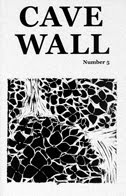 A recent note from Rhett Rhett Iseman Trull, Editor of Cave Wall, journal of poetry, is a good reminder of the importance of subscribing to literary magazines as a way to get great reading material in your hands, but also to help support these endeavors. It’s a tough time for us all, but collectively, subscriptions really can make a difference in helping mags through the year.
A recent note from Rhett Rhett Iseman Trull, Editor of Cave Wall, journal of poetry, is a good reminder of the importance of subscribing to literary magazines as a way to get great reading material in your hands, but also to help support these endeavors. It’s a tough time for us all, but collectively, subscriptions really can make a difference in helping mags through the year.
If you don’t already, take the step and subscribe to a couple. If you don’t “need” or want any more lit mags, then get a subscription for a friend, for your local library, elder care home, domestive violence shelter, juvie detention center, runaway home, high school creative writing class, prison, alternative high school, church – be creative! There are lots of organizations and groups that would probably really appreciate having good reading.
Even better – teachers! – get your students to subscribe as required reading – either to one specific journal for the whole class, or let them browse the NewPages list and pick one of their own choice. There are many creative ways to work with these in the classroom. Ordering a set of backcopies is also a quick and easy way to get the whole class on the same page. I’ve always had good luck with our bookstore ordering from small lit mags, and sometimes have ordered them myself and collected the money from my students. Do what you can to get students reading and keep these great publications going!
From Rhett: “There has never been a better time to subscribe to Cave Wall than this month, during our September 2009 Back Issue Sale, where current and new subscribers can purchase back issues 1-5 for just $4 each. If you have been wanting to subscribe, or if your subscription has lapsed and you missed a few issues, now is a great time to act. Also, with the holidays approaching, what better gift for a poetry lover than a complete set of Cave Wall back issues? In these difficult economic times, Cave Wall appreciates your support more than ever.”
Spread the word!
NewPages Updates :: September 04, 2009
NewPages Guides to Writing and Book Contest are continually updated so check those pages often.
Added to the NewPages Guide to Literary Magazines
The Chariton Review
Xavier Review
Yale Anglers’ Journal
Talking River
The Southern Quarterly
Boiling River
Added to the NewPages Guide to Conferences, Seminars, Workshops
Sewanee Young Writers’ Conference – For high school students (Sewanee, TN)
Writing for Stage & Screen – Vermont College
Writing Away Retreats – Breckinridge, CO
Missouri Writers Guild Conference
Roanoke Review
Kenyon Review Young Writers’ Workshop (Gambier, OH)
Spread the word!
The Graceful Envelope
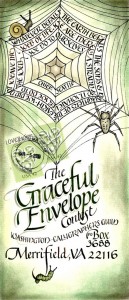 The Graceful Envelope Contest is sponsored by the National Association of Letter Carriers and administered by the Washington Calligraphers Guild.
The Graceful Envelope Contest is sponsored by the National Association of Letter Carriers and administered by the Washington Calligraphers Guild.
This year’s theme was Address the Environment. Entrants were urged to design an envelope that promotes the preservation of our natural world and address it artistically. A trio of judges looked for skill in lettering, effective use of color and design, and creative interpretation of the theme.
This year, close to 150 entries were received; 12 were selected as “Winners” and 18 were given the distinction “Honorable Mention” in the contest’s adult division. The judges also selected student winners from 250 entries in the junior and children’s divisions.
Visit the website to see all of the winning entries from this year as well as an archive of winners from years past.
[Pictured: Best in Show winning entry by Gerry Jackson Kerdok]
Spread the word!
Carl Sandburg Residency
Having been to this historic home, I can say with certainty that this is an idyllic location for a residency.
Carl Sandburg Writing Residency
Mrs. Paula Sandburg first generated the idea of a writer-in-resident at Connemara when her family’s North Carolina home became a unit of the National Park Service shortly after her husband’s death in 1968. Carl Sandburg Home National Historic Site is pleased to host its first Writer-in-Residence Program in March 2010.
This program offers poets an opportunity to live and work at Carl Sandburg Home National Historic Site. The three-week residency is scheduled for March 2010. Housing is offered in an historic cottage near the Sandburg Home, with a studio and stipend provided.
As part of the program, writers will be required to do two public programs, the first a short fifteen-minute presentation describing their work during a welcome reception. The second will be an outreach program to an audience of the writer’s choice. Writers must also donate one original piece of their work to the park’s permanent museum collection, copyrights will remain with the writer.
The deadline for submissions is October 15,2009. Selection for the 2010 residency will be announced during the second week of December 2009.
This program is made possible through support from the Friends of Carl Sandburg at Connemara.
Spread the word!
New Lit on the Block :: Black Market Review (UK)
The Black Market Review (annual) is edited exclusively by Creative Writing undergraduate and postgraduate students at Edge Hill University. BMR publishes poetry, fiction and creative nonfiction, translations, art/photography, reviews and interviews.
This first issue is an enormous effort – with nearly two dozen staff members working on the variety of content. It is dedicated to Lisa Ratcliffe, who was a student at EHU and who it appears passed away in February from some type of cancer. Robert Sheppard writes a piece in tribute to her, and the issue itself includes a fiction piece written by Lisa, “Las Cartas.” There’s also a link to her blog, which is tough but touching read of her final weeks.
BMR also features the following authors and artists: Robert Sheppard, James Reidel, Kimberly Johnson, Rupert Loydell, Nicholas Samaras, Galvin Selerie, C. E. Chaffin, Carol Parris Krauss, David Toms, Donal Mahoney, Felicia Zamora, Ginna Wilkerson, Rodrigo V. Dela Pe
Spread the word!
Saint John of the Five Boroughs
Falco begins this novel by introducing us, one by one, to the characters: Avery, a rebellious art student at Penn State, Lindsey and Hank, Avery’s aunt and uncle, and Kate, Avery’s widowed mother who is having an affair with Hank, her brother-in-law. The main story involves Avery and Grant, a thirty-something former performance artist from New York she meets at a campus party. Avery runs away to New York with the mysterious Grant after knowing him for less than 24 hours. In New York, Avery is thrown into the heart of the avant-garde art scene; Grant’s friends include a famous artist, a successful TV writer and a restaurateur. Grant himself had early success as a writer, but after he killed a man in self-defense while trucking stolen goods across state lines for his shady uncle Billy, he stopped writing. Now Grant’s only source of income is further work for Billy, who keeps him on the fringes of his criminal enterprises out of respect for his brother, Grant’s father. Continue reading “Saint John of the Five Boroughs”
Spread the word!
Other Resort Cities
In his second collection of short fiction, Tod Goldberg delivers ten seductive stories that target the traumatic reality of failed dreams and the struggle to make amends with the past. Each kinetic story pulses and pops with authenticity. Goldberg has not a word misplaced, often times weaving tragedy and beauty with the result of heartbreaking height, similar in style to Mark Richard or Thom Jones. His characters find themselves trapped, whether literally or figuratively – lost in a world where they cannot connect with the projected image of themselves or attain the goal of a satisfied life. In one of the most moving and powerful stories “Walls,” Goldberg navigates the fractured childhood of an unspecified number of siblings, using We as the narrator, dissecting their Mother’s sexual relationships to ultimate and devastating effects. Continue reading “Other Resort Cities”
Spread the word!
One of These Things Is Not Like the Others
“I try to name the thing we never missed until it was lost, all the things that never stood a chance in this beautiful world.” So ends “My Neighbor Doesn’t Remember Everything She Forgets” from Stephanie Johnson’s debut One of These Things Is Not Like the Others, and it may well serve as a capsule of its concerns: to carefully observe life’s vicissitudes, to spotlight minutiae, to bear witness. The book is filled with internal squalls and domestic squabbles. In story after story, scene after scene, there is Johnson’s unwavering focus, and you can almost see her sharpening her senses. Continue reading “One of These Things Is Not Like the Others”
Spread the word!
Van Gogh in Poems
In the introduction to her most recent book of poetry, Van Gogh in Poems, Carol Dine writes of the research she undertook to pen her artist-inspired poems. Her book, she writes, led her to Amsterdam three times, where she visited the Van Gogh Museum to study the artist’s original work – up close. Dine describes how she was allowed to sit in a room while an attendant brought her requested works on paper. She studied them for inspiration, and deemed them holy. Her viewing of the artist’s sketchbook brought her to tears. Van Gogh in Poems contains 18 plates of the artist’s works on paper. Continue reading “Van Gogh in Poems”
Spread the word!
After the Honeymoon
The characters that populate Nathan Graziano’s new book of poetry, After the Honeymoon, remind me of my neighbors and friends growing up in working class Philadelphia: many of these folks had rough, troubled lives, and more often than not happiness was squelched by substance abuse, poverty, poor education, and unemployment. It was the rare exception that someone had the self-reflection and self-discipline to ascend the neighborhood’s social pitfalls. While Graziano’s book could be set in almost any working poor urban area in our country, its depictions of hard-scrabbled living – and the desire to rise above it – is utterly familiar to my autobiography and is refreshing to see in contemporary poetry. Continue reading “After the Honeymoon”
Spread the word!
Beats at Naropa: An Anthology
In a 1948 conversation with John Clellon Holmes, Jack Kerouac said, “Ah, this is nothing but a beat generation.” The phrase, like Gertrude Stein’s “lost generation,” soon became emblematic of its time, though not all of its adherents approve of the label (Diane di Prima, Lawrence Ferlinghetti, and Gary Snyder are just three of its detractors). What most of the “Beats” found in Beats at Naropa have in common is their connection with Kerouac himself. The book contains mostly transcripts of speeches and conversations held at what is now called Naropa University but what was originally known as the Jack Kerouac School of Disembodied Poetics in Boulder, Colorado. It’s a compulsively readable volume, full of facts and opinions. Continue reading “Beats at Naropa: An Anthology”
Spread the word!
Life Goes to the Movies
Life Goes to the Movies tells of the uncanny friendship of two men growing up in the 1970s. Both men struggle to define who they are in a world where they don’t seem to fit in. Nigel DePoli, son of Italian immigrants, wants desperately to be someone with a sense of belonging. Dwaine Fitzgibbon is looking for a way to be separate from society while still intermingling enough to show others the parts of life that they don't normally see. Their bond begins in a mutual love of movies and only grows stronger as they start making short films that show “true life” rather than losing “themselves in some totally made up bullshit that has nothing, absolutely nothing to do with real life.” However, things change as Dwaine becomes more passionate about his movies and Nigel desires more and more the ‘normal’ life that Dwaine diverted him from. The reader will find themselves laughing at some of Dwaine’s outrageous ideas and rooting for the friends when things seem to be at their lowest point. An enjoyable read from the beginning, Selgin grabs the reader’s interest and drags them along for all of Nigel and Dwaine’s fascinating adventures in life and film. Continue reading “Life Goes to the Movies”
Spread the word!
Rupert: A Confession
Even for a novella (though the publishers call it a novel) of slightly over one hundred and thirty pages, there is not a lot of plot movement in Rupert: A Confession. The story is basic: the protagonist, Rupert, gives a three-art confession to a jury about a crime he was alleged to commit. In the process, we discover he has a vast array of pornography meticulously cataloged, has been thrown out of massage parlor for ejaculating on the proprietor, and conceives of his own life as either a stage production or an offspring of Japanese warriors. Otherwise, the book centers on the rise and fall of his idealized girlfriend Mira, who at turns is taciturn, cranky, or sexually insatiable. Continue reading “Rupert: A Confession”
Spread the word!
Rupert: A Confession
Even for a novella (though the publishers call it a novel) of slightly over one hundred and thirty pages, there is not a lot of plot movement in Rupert: A Confession. The story is basic: the protagonist, Rupert, gives a three-art confession to a jury about a crime he was alleged to commit. In the process, we discover he has a vast array of pornography meticulously cataloged, has been thrown out of massage parlor for ejaculating on the proprietor, and conceives of his own life as either a stage production or an offspring of Japanese warriors. Otherwise, the book centers on the rise and fall of his idealized girlfriend Mira, who at turns is taciturn, cranky, or sexually insatiable. Continue reading “Rupert: A Confession”
Spread the word!
Censoring YA Reading – OMG, Seriously?
“This time, the principal at St. Edmund Campion Secondary School has pulled the classic American novel To Kill a Mockingbird from the school’s Grade 10 classrooms. He made the decision after a parent lodged a verbal complaint about language used in Harper Lee’s Pulitzer Prize-winning novel.”
Of course, reader’s circles, certainly not a new idea, is one way to respond to selecting texts for students: let students each choose their own books. I think that might make some people’s(aka parents and adminstrators) heads explode…
Spread the word!
New Lit on the Block :: Sunsets and Silencers
Sunsets and Silencers publishes short fiction, flash fiction, creative non-fiction, poetry, essays, paintings, photography, and comic strips as a platform for emerging and established artists to showcase their work. The online journal is a subsidary of Nexus print, a biannual literary, cultural, and art magazine published by NexusCreative, a non-profit public benefit organization interested in opening new and exciting channels for creative expression.
Behind the scenes at Sunsets and Silencers are Founder and Editor Chuckie Campbell, Poetry and Fiction Editors Sarah McCartt Jackson and Bryan Jackson, and “Readers and Contributers,” though plural, lists only Sam Meyer, so maybe there’s room for more here.
This first issue includes contirbutions of fiction, poetry, and various forms of art by Beth Couture, Pete Pazimo, Russell Helms, Peter Scwartz, Christian Ward, Stephen Mead, Christopher Woods, Patrick O’Neil, Ben Nardolilli, Melanie Griffith, Bobi Conn, Jessica McEuen, and Adam Shaw.
Sunsets and Silencers is accepting submissions, and indicates that “On promising work, we may offer feedback, even if the piece didn’t work for us. Please, keep in mind, however, that we do not respond to every piece, mostly because of the volume of submissions received. We want to provide exposure to artists and writers who create out of a restless fever, and who are fearless in their choice to submit.”
Spread the word!
Narrative Spring Story Contest Winners
Narrative Spring Story Contest winners and finalists:
First Prize: Anthony Marra
Second Prize: Jane Delury
Third Prize: Paul Griner
Finalists: Alethea Black, Evan Christopher Burton, Vicky Grut, Jeff O’Keefe, Denise Morrissey, Jay Neugeboren, Mohan Sikka, Debra Spark, Jackie Thomas-Kennedy, Jill Widner
Narrative offers the following upcoming contests for writers:
The Fall 2009 Story Contest, with a First Prize of $3,250, a Second Prize of $1,500, a Third Prize of $750, and ten finalists receiving $100 each, is open to fiction and nonfiction entries from all writers. Deadline: November 30, 2009
The Narrative 30 Below Story Contest, with a First Prize of $1,500, a Second Prize of $750, a Third Prize of $300, and ten finalists receiving $100 each, is open to all artists and authors, ages eighteen to thirty. Deadline: October 29, 2009
Spread the word!
New Lit on the Block :: Squid Quarterly
Squid Quarterly is an online journal of short fiction and prose poetry founded by Beth Couture and Jeff Tucker, both writers at the Center for Writers at the University of Southern Mississippi.
This first issue includes works by Kristen Eliason, Andrew Farkas, Rachel Furey, Darin Graber, Sarah Jenkins, Jen Marquardt, Tim Marsh, Michelle Nichols, Lance Olsen, Melanie Page, Leigh Phillips, Matthew Purdy, and Wendy Vardaman.
SQ is currently accepting submissions for their second issue. SQ nominates for the Pushcart Prize and plans to publish a print anthology of select works at the end of the year.
Spread the word!
Jobs :: Various
Eastern Illinois University has a tenure-track position in Creative Writing to start Fall 2010. Dr. Dana Ringuette, English Department. Nov 6
The English Department of Willamette University invites applications for the tenure-track Hallie Brown Ford Chair in Writing. REview begins Nov 9.
The Department of English at CUNY’s Brooklyn College Assistant or Associate Professor of Poetry. Review begins Oct 21.
The American University of Sharjah, UAE seeks candidates for a Department Head for the Department of English as well as Department Head for the Department of Mass Communication for Spring 2010.
Shippensburg University Assistant Professor of Creative Writing—Fiction, tenure-track. Richard Zumkhawala-Cook, Chair. Review begins Nov 2.
Brooklyn College Assistant or Associate Professor of Poetry. Michael T. Hewitt, AVP for Human Resource Services. Review begins Oct 21.
George Mason University, tenure-track assistant professor of creative writing, poetry. William Miller, Chair/Search Committee. Review begins Oct 1.
Spread the word!
Aspen Book Store to Close
Aspen Book Store in Little Nell will close September 8 for what owner John S. Edwards says are a variety of reasons, including his desire to spend more time reading after 20 years of bookselling. Happy reading John!
Spread the word!
Thomas Lux and the Decatur Book Festival
This article on the Decatur Book Festival (Sept 4-6) includes some great comments from poet Thomas Lux – worth reading the whole piece – but here’s a couple clips:
Lux thoroughly appreciates poems with humor. “Why shouldn’t poetry be funny? Life is funny. I don’t like the kind of turd-in-a-punchbowl professor who says ‘Poetry can never be funny! It has to be serious!'”
…Lux’s classrooms take an approach that offers an easier gateway for students and adult readers alike. “I’ve always done something Billy Collins described as ‘teaching backwards.’ You start by having [the students] read the very contemporary poems, the stuff in the language of today, even hip-hop lyrics, then go backward to the classics. For several generations, our students’ introduction to poetry was through great poets, essential poets, who nevertheless didn’t speak in the language that we speak today.”
Spread the word!
NewPages Reviewers Write
A couple former NewPages Review Writers who just keep keeping on in their literary endeavors:
Dan Moreau has a story, “Submission Guidelines” in the new issue of Swink.
Aaron Gilbreath has a “short thing” – also known as “Try Mailing This to Alpha Centauri” in Front Porch Journal.
Spread the word!
Passings :: Lindsay Patterson
 Author Lindsay Patterson, who wrote several books, anthologized the poems, plays and films of Afro-American artists and taught at a wide range of major colleges and universities (including Hunter and Queens in New York), died Wednesday, August 26 after a six-month battle with cancer. Born in Bastrop, Morehouse Parish, Louisiana, on July 22, 1934, Lindsay was the son of Dr. James and Adele Patterson. He graduated from high school in Winston-Salem, N.C. and received his B.A. in English from Virginia State University before serving in the US Army, where he was a reporter for Stars and Stripes. He is survived by his brother and sister-in-law, James and Mildred Patterson, Jr. of Kernersville, N.C. and his nephews, James III and Roger Lindsay (who was named for his uncle).
Author Lindsay Patterson, who wrote several books, anthologized the poems, plays and films of Afro-American artists and taught at a wide range of major colleges and universities (including Hunter and Queens in New York), died Wednesday, August 26 after a six-month battle with cancer. Born in Bastrop, Morehouse Parish, Louisiana, on July 22, 1934, Lindsay was the son of Dr. James and Adele Patterson. He graduated from high school in Winston-Salem, N.C. and received his B.A. in English from Virginia State University before serving in the US Army, where he was a reporter for Stars and Stripes. He is survived by his brother and sister-in-law, James and Mildred Patterson, Jr. of Kernersville, N.C. and his nephews, James III and Roger Lindsay (who was named for his uncle).
He arrived in New York in 1962 to be a writer. And he was indeed a major writer. In his four decades in New York, he was a regular contributor to the New York Times, as well as its book review, Essence Magazine, Newsday, Playbill, ANPI and dozens of other newspapers, magazine and wire services. He hosted an interview program on WRVR-FM and on WPIX-TV for several years, interviewing the major movers, shakers and artists within the black and white theatre and cultural worlds, leading to long-term friendships with Ossie Davis, Ruby Dee and many others. His papers were assembled to form The Lindsay Patterson Collection in Boston University’s Howard Gottlieb Archival Research Center.
According to Lindsay’s friend, fellow writer Pearl Duncan, he was obsessed with American literature. As he lay in the hospital, post-op, Ms. Duncan read to him from Hemingway’s “A Moveable Feast.” “Before I could read the words, Lindsay was reciting them. He knew that book by heart.”
James Patterson described his younger (by ten months) brother as a voracious reader. “He just loved to read. Lindsay also always had an inquisitive mind; he just wanted to know how things worked.” James added, “Several years ago, Lindsay embarked on an investigation into the family ancestry, devoting hours and hours in researching our background.”
Lindsay’s sister-in-law, Mildred Patterson, stressed that Lindsay was an extremely talented person. Very caring, she said. But also very private with a passion for writing and the arts.
His books include:
A Rock against the Wind; African-American Poems and Letters of Love and Passion, edited by Lindsay Patterson with a forward by Ruby Dee
Black Theater, A 20th Century Collection of the Works of Its Best Playwrights, compiled with an introduction by Lindsay Patterson
Anthology of the Afro-American in the Theater
The Afro-American in Music and Art
Introduction to Black Literature in America
T-Baby (unfinished novel, excerpted in Essence Magazine)
Lindsay had been an assistant professor of English (ret) at Queens College; adjunct professor of Afro-American & Caribbean Literature at Hunter and also taught at The College of New Rochelle and The Frederick Douglass Creative Arts Center. Early in his career, he worked as assistant to Langston Hughes and to Mrs. Countee Cullen. He also guest lectured at Columbia, Kent State, Iowa University, Penn State, University of Connecticut, Medgar Evers College, Clark University, 100 Black Women, among many more.
Among the publications for which Lindsay wrote are:
The Black World Today
Kente Cloth/North Texas Press
Upscale Magazine
Shooting Star
Newsday
Playbill
Theater Week
New York City Tribune
Players Magazine
Modern Black Man
Schomburg Center
Essence
New York Times / (regular contributor) plus Book Review; op-ed page My Father, Dr. Pat
Writers Yearbook
ANPI
[From neighbor/friend Ellen Levene.]
Spread the word!
Farewell Reading Rainbow
The final episode of Reading Rainbow aired today. With no further support from PBS or any other sources (some faulting Bush administration decisions), the show will not go on.
Spread the word!
Friday Funny
Spread the word!
New Lit Playground :: NetPoetic
NetPoetic digital poetry portal is a new Electronic Literature/Digital Poetry portal founded by Jason Nelson and Davin Heckman. With over 30 writers, thinkers and artists, NetPoetic is a group conversation, updated near daily with posts, news, theory, artworks and all manner of E-Lit related material.
Currently on the site is feature about The Longest Poem in the World “composed by aggregating real-time public twitter updates and selecting those that rhyme. It is constantly growing at ~4000 verses / day. You can see more verses by clicking the three dots at the bottom (• • •) Made by Andrei Gheorghe.” And you can read more about the project on NetPoetic.
Those who want to “play” do need to send in a request, and once approved will receive a user name and password to log into the portal. Plans for later in the year include the first NetPoetic exhibition and a peer reviewed journal.
Spread the word!
Interview with Billy Collins
Littoral, the journal of the Key West Literary Seminar, has a new interview with Billy Collins. In it, the two-time U.S. Poet Laureate and “most popular poet in America” discusses his rivalries with poets from Emily Dickinson to Ron Padgett, explains why “transparency” has no place in poetry, and celebrates the pleasures of disorientation in the age of the GPS.
Spread the word!
New Lit on the Block :: Boiling River
Boiling River is a new web-based poetry journal edited by Issa Lewis. The publication accepts “all types” of poetry and encourages its writers to “take risks with their writing.”
Lewis comments that this inaugural issue took a bit more time to bring to publication than she had expected, but it’s no wonder when you take a look at the first issue’s line up: Melissa Amen, Lana Hechtman Ayers, Lea Banks, Cynthia M. Bargar, Lisa Marie Brodsky, Courtney J. Campbell, SuZanne C. Cole, Lea Deschenes, Nancy Devine, Eddie Dowe, Roberta P. Feins, Michael Fisher, John Flynn, Maria D. Laso, Jackson Lassiter, Amy MacLennan , Thomas Michael McDade, Stephen Mead, Laura Miller, Anne Britting Oleson, Alicia Suskin Ostriker, Christina Pacosz, Jacqueline Powers, Michael Schmeltzer, J.R. Solonche, Aline Soules, Alex Stolis, Angela Velez.
Boiling River is currently open for submissions until September 1.
Spread the word!
Shark Poetry Winners
Know any shark lovers? The Aquarium of the Pacific (Long Beach, CA) held a poetry contest to salute the Aquarium’s Shark Summer. Aquarium members and guests were invited to participate; poets were asked to express their feelings about sharks and/or rays and to use no more than 200 words. All entries were judged by poets Will Alexander and Jeffrey Yang and Aquarium President and CEO Jerry Schubel and four winners were selected:
First Place – Ellaraine Lockie
Second Place – Anna Leahy
Third Place (tied) – Benjamin Morris and Donna Ashbaugh
All poems are available on the aquarium’s website.
Spread the word!
Calls for Submissions & NewPages Updates
Calls for Submissions updated (dated 8/25) – lots of quality publications, anthologies, and inaugural issues looking for fresh, new, writers and established voices.
Welcome these new additions to the NewPages Guides. Visit the NewPages homepage for links to all of our guides.
Contests updated regularly.
Literary Magazines
College Hill Review – essays in criticism of the arts and humanities, review essays, poetry, fiction, and creative nonfiction
There Journal – poetry, art, essays, activism
Aethlon – poetry, fiction, nonfiction, drama, book reviews
Coe Review – poetry, fiction
Euphony – poetry, fiction, essays, reviews, nonfiction, drama
Of(f)course – poetry, fiction, essays, reviews, concerts, art
Poetry Miscellany – poetry, essay, translation, photography
out of nothing – image, sound, text, digital arts
Conferences, Workshops, Seminars
Milton Conference
Indie Record Labels
Fire Museum Records
Spread the word!
Professor Lindhauer’s Museum Studies Books :: Alyssa Salomon
 Professor Lindhauer’s Museum Studies Books by Alyssa Salomon
Professor Lindhauer’s Museum Studies Books by Alyssa Salomon
Spread the word!
To Kill or Not To Kill Fee
Writer Beware blogger Victoria Strauss discusses the different definitions of “kill fees” in today’s world of publishing, and why she thinks they’re bad mojo.
Spread the word!
Interview with Rachel Hadas
Check out Contemporary Poetry Review’s interview with poet Rachel Hadas, which explores the role of poet-critics (“Inevitable task? Obligation?…I think I probably felt fairly early on that reviewing teaches you what you really think about a writer; that I had as much of a right to write about poetry as other young poets did…”) and the “health” of poetry as art (“This question seems to invite a kind of pontificating I’d rather avoid.” – ah, but she doesn’t).
Spread the word!
Reading Healthcare from the Outside
The brutal truth about America’s healthcare
, a story from The Independent (UK) offers an outsider’s rhetoric on America’s current issues of health care and politics – a perspective more often read by Americans about other countries. (via Alan Sondheim)
Spread the word!
Two Words: New Blog on Lit and Translation
A note from Scott Esposito from The Center for the Art of Translation announcing a new blog, Two Words:
We’re eager to make the blog a resource for people who love literature, especially the translated variety. Already there are a number of interesting articles up, and in the next few months we’ll be publishing interviews with authors and translators, original articles written just for Two Words, and news on international authors.
You’ll also find links to audio from our series of events in San Francisco. We’re working on making several years’ of audio available, and you can currently hear people like Edith Grossman, Robert Hass, and Yoko Tawada talk about literature and translation.
To give an idea of what to expect on Two Words, here are some recent posts:
Susan Bernofsky on translation
Jose Manuel Prieto on diamond forgery and his novel Rex
Yerra Sugarman on the Yiddish modernist poet Celia Dropkin and her ties to Sylvia Plath
Spread the word!
Cool Schools Near You
 The September/October issue of Sierra features their annual annual honor roll of “Cool Schools,” selecting the top ten colleges that “not only teach about a better world but also do something about it.” Runners up are included to total 20 top schools; the website lists all 135 schools reviewed.
The September/October issue of Sierra features their annual annual honor roll of “Cool Schools,” selecting the top ten colleges that “not only teach about a better world but also do something about it.” Runners up are included to total 20 top schools; the website lists all 135 schools reviewed.
Spread the word!
Apostrophe Cast Reading Series Podcast
Previously posted but missing link (sorry readers!):
Edited by Guy Benjamin Brookshire, Amanda Choi, Danielle Roderick, and John Dermot Woods, Apostrophe Cast is a bi-weekly online reading series, delivered as a podcast. Every other Wednesday evening they post a new reading from a different writer. One author, one reading. You can listen directly from the site or subscribe to the podcast and have MP3’s of readings delivered to automatically.
With this impressive list of authors, I can’t believe there isn’t someone already there for everyone, with the promise of more to come:
James Belflower
Joan Biddle
Matt Bondurant
Randall Brown
Blake Butler
Amina Cain
Brian Connell
Mark Ehling
Dandy Elf
Brian Evenson
Daniel Groves
Garth Risk Hallberg
Clane Hayward
Sheila Heti
B.J. Hollars
MC Hyland
Kristen Iskandrian
Shane Jones
Porochista Khakpour
Matthew Kirkpatrick
Michael Kimball
Amy King
Mark Leidner
Sam Lipsyte
Andrew Lundwall
Sabrina Orah Mark
Josh Maday
Carson Mell
Richard Nathan
Celeste Ng
Alissa Nutting
Ned Oldham
Danielle Pafunda
Joshua Parkinson
Cecily Parks
Sheri Reynolds
Mary Phillips-Sandy
Jane Sandor
Shanthi Sekaran
Richard Siken
Claudia Smith
Nida Sophasarun
Donna Stonecipher
Michael Swierz
Ben Tanzer
Allison Titus
Jesse Toussaint & Dent Sweat
Harry Thomas
William Walsh
James Warner
Caki Wilkinson
Ryan Wilson
Ying Xu
Spread the word!
Passings :: Richard Poirier
 Richard Poirier on passed away on August 15, 2009, at the age of 83. The College Hill Review blog has provided an extensive list of web resources associated with his work, recognizing him as “a teacher, mentor, and friend” to many CHR contributors, and that “He taught at Williams and Harvard before coming to Rutgers University in 1962 where he built one of the most respected department of English Studies in the country.”
Richard Poirier on passed away on August 15, 2009, at the age of 83. The College Hill Review blog has provided an extensive list of web resources associated with his work, recognizing him as “a teacher, mentor, and friend” to many CHR contributors, and that “He taught at Williams and Harvard before coming to Rutgers University in 1962 where he built one of the most respected department of English Studies in the country.”
Spread the word!
More Austen Mash-ups Expected.
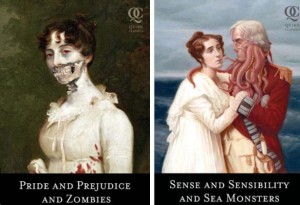 Apparently, Pride and Prejudice and Zombies just wasn’t enough for fans of the new “mash-up” genre – more adaptations are on the way. As a major Austen fan, I’ll be taking a pass on these. I did try to read P&P&Z, but couldn’t make it past the first dance sequence – reminds me a bit too much of adolescent gore-mongering. I wasn’t into it then, either. Though, perhaps there is a silver lining in that people who might not otherwise have read Austen now are – ? Does this count as reading Austen? Better than Cliff Notes, at least?
Apparently, Pride and Prejudice and Zombies just wasn’t enough for fans of the new “mash-up” genre – more adaptations are on the way. As a major Austen fan, I’ll be taking a pass on these. I did try to read P&P&Z, but couldn’t make it past the first dance sequence – reminds me a bit too much of adolescent gore-mongering. I wasn’t into it then, either. Though, perhaps there is a silver lining in that people who might not otherwise have read Austen now are – ? Does this count as reading Austen? Better than Cliff Notes, at least?
Spread the word!
Humor for Editors
Spread the word!
2009 Cabell First Novelist Award
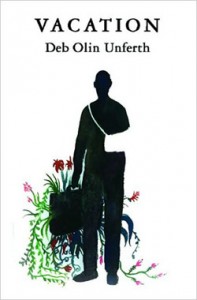 Deb Olin Unferth from has won the 2009 Cabell First Novelist Award ($5000) from Virginia Commonwealth University for Vacation published by McSweeney’s Books.
Deb Olin Unferth from has won the 2009 Cabell First Novelist Award ($5000) from Virginia Commonwealth University for Vacation published by McSweeney’s Books.
Spread the word!
iPhone Haiku Contest
 “AMF’s [Ann Marie Fleming’s] stickgirl has been busy exploring her brand new iPhone and needs your help in developing her very own free, collaborative poetry application. This application will work like a snow-globe oracle: ask stickgirl a BIG LIFE question, shake the iPhone, letters with float through the air, settling to form a haiku, based on your query. Stickgirl will then interpret the poem, and tell you your fortune, leaving the reader with a pearl of uplifting daily wisdom. In order for this app to be successful we need a lot of poetry. We’re inviting you to fill out the form below and submit your original haikus. We will use your haikus in our iPhone app, and recognize your contribution on our website.” Deadline Sept 1 (Sleepy Dog Film Films)
“AMF’s [Ann Marie Fleming’s] stickgirl has been busy exploring her brand new iPhone and needs your help in developing her very own free, collaborative poetry application. This application will work like a snow-globe oracle: ask stickgirl a BIG LIFE question, shake the iPhone, letters with float through the air, settling to form a haiku, based on your query. Stickgirl will then interpret the poem, and tell you your fortune, leaving the reader with a pearl of uplifting daily wisdom. In order for this app to be successful we need a lot of poetry. We’re inviting you to fill out the form below and submit your original haikus. We will use your haikus in our iPhone app, and recognize your contribution on our website.” Deadline Sept 1 (Sleepy Dog Film Films)
Spread the word!
The History of Rock Music
I’m told it’s one of the most complete sources on the web.
Spread the word!
Fire Museum Records
A very small but amazingly eclectic label, Fire Museum Records is worth checking out. I’ve just ordered AZADI! benefit compilation CD for the Revolutionary Association of the Women of Afghanistan (RAWA). “A diverse 2-CD set of avant-rock, electronic, world, experimental, jazz, folk, noise, improv, hip-hop, dancefloor, and modern classical music.”
20 Minute Loop is one of 34 artists from the SFBay area and around the globe featured on this 2-hour album.
Spread the word!
To Hell with Publishing
From Emma Young at To Hell with Publishing, UK:
We’re a young publishing house with a new direction. In our first two years we published works by the likes of Kevin Cummins and Michael Smith, and we are now about to launch the fourth edition of To Hell with Journals, a literary journal with a lifespan of 26 issues. The first three have been guest-edited by Lee Brackstone, Hisham Matar and Lisa India Baker and our new edition will be edited by Hans Ulrich Obrist (curator of the Serpentine Gallery). In Andrew O’Hagan words: “The Kingdom of literature was built on the genius of small magazines, and none is more vital nowadays than To Hell with Journals.”
To Hell with Publishing was founded with the aim of reviving the role of the independent press in the UK’s literary scene and inspired by the movement kick-started by Lawrence Ferlinghetti’s City Lights bookshop.
We’re a small and truly independent publisher with a new business model to limit risk for the first time novelist (without taking the fun out of it).
We want to kick-start the careers of writers who are capable of creating quality fiction and we want the list to reflect our own eclectic and free-spirited reading habits. We choose to champion new writing and have therefore had to find a new way of publishing during these incredibly difficult times.
There’s more info on our new imprint here.
For people who already have a literary agent, we are also now accepting submissions for To Hell with Prizes. The deadline for submissions is October 2009 and all the details are on our website. The inaugural award of £5000 will be presented at an awards ceremony in April 2010.
Spread the word!
Arroyo Literary Review – Spring 2009
A promising premier beginning with fascinating cover art – a “threadwork portfolio” by Lisa Solomon whose threadwork images appear throughout the journal – Marvin Bell’s moving “dedication poem” (“The Book of the Dead Man (Arroyo)”) featuring Bell’s signature anaphoric lines; a terrific interview with novelist Eric Miles Williamson, a graduate of the California State University system where Arroyo is published; five strong stories; and contributions from ten poets, including more work by Bell. Continue reading “Arroyo Literary Review – Spring 2009”

